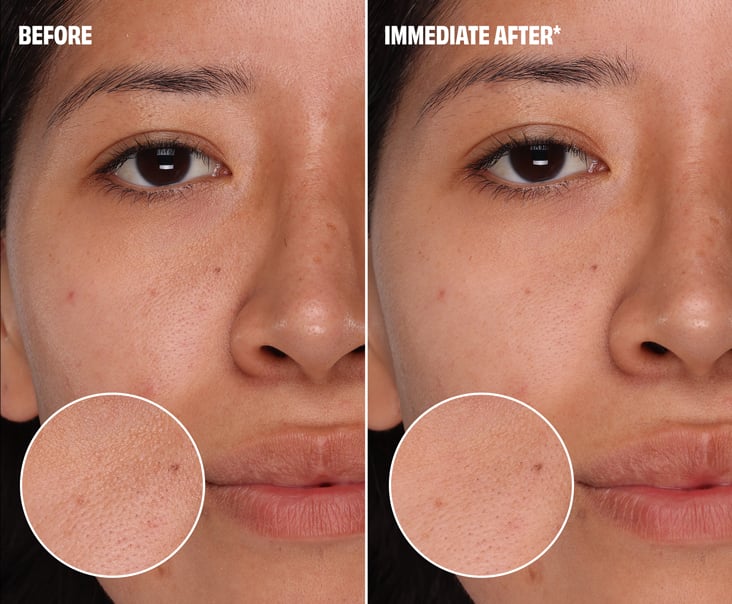Clogged Pores


Clogged Pores
By Giner Munos Perez, Benefit National Beauty & Brow Authority, Spain
Feb 1, 2023
Struggling with clogged pores? I hear you and know the struggle, too. I’m going to let you in on a little (okay, kinda big!) secret: clogged pores are super normal, and nothing to be ashamed of!
We are constantly bombarded with tons of negative messages in the beauty industry surrounding our pores. But helloooo…pores (and clogged pores) are just part of life! And THAT is more than okay.
At Benefit, we just don’t think pores have to be so negative, ya know? You can still minimize the look of your pores, unclog your pores, visibly improve your skin texture, and reach your pore goals, you just gotta know where to look and who to ask. And good news: you definitely came to the right place. Hi, hello! We are your Pore Experts, and we’re ready to share everything they know so you can get the results you’ve been looking for. So, let’s do more for our pores—together.
If you’re worried about your pores or you feel like you just don’t know enough, stop right there! You don’t have to be a pore expert—that’s my job. So, let’s start with the facts: what ARE pores?
Pores are tiny openings in our skin that are home to hair follicles and sebaceous glands. When they get “dirty” or clogged, you might start to notice imperfections begin to form on your skin.
“SOOO many different things can cause our pores to become clogged,” says Jared Bailey, Benefit Global Brow & Beauty Authority and licensed esthetician. “Leftover makeup, dry skin, oil, dirt, dead skin cell build-up, and sweat can be one-way tickets to Clogged Pore City.”
Here are a few of the most common culprits:
*This is what started us on our own pore journey in 2010. Our first pore primer, The POREfessional, led to a whole line of products focused on putting pores first.
SOOO many different things can cause our pores to become clogged,” says Jared Bailey, Benefit Global Brow & Beauty Authority and licensed esthetician. “Leftover makeup, dry skin, oil, dirt, dead skin cell build-up, and sweat can be one-way tickets to Clogged Pore City.”
No doubt you’ve seen a million videos talking about how to unclog your pores for good, but I’m here to tell you—you can’t, babe. It’s not a thing.
Benefit has been doing this for a long time, and with more than 5,000 Pore Experts all over the world on speed dial, not a single one will ever tell you that you can TOTALLY get rid of your pores or prevent them from ever clogging again. BUT there are ways to unclog your pores, clean your pores, and visibly minimize their appearance. It’s not a complicated process to get there, either.
Here’s what our global Pore Experts recommend:
Take off your makeup daily (no matter how tired you are) with a pore cleansing oil (like The POREfessional Get Unblocked).
Remove dirt and oil with a gentle cleanser (The POREfessional Good Cleanup is fast, effective, and gentle).
Gently exfoliate (chemically or physically) to slough off dead skin cells that can cause clogging (lookin’ at you, The POREfessional Tight ‘n Toned foaming toner—it’s got AHAs + PHAs to chemically exfoliate skin).
Use a clay mask once a week to clear pores. We looove The POREfessional Deep Retreat for our weekly clay mask moments!

*Images have been sourced from a clinical trial of The POREfessional Deep Retreat. Results may vary.
To be straight with you, clogged pores aren’t 100% avoidable...BUT they are 100% manageable and should be embraced using pore-positive solutions that do exist.
Adopting a consistent Pore Care routine will help you fall in love with your pores (believe it!). That’s why we’re here: to give you the confidence you need to get to know your pores—and your skin—like you never have before.
Dive deep into our pore education resources (the more you know!).
Sources
Not all makeup will clog your pores, but some definitely can—especially when it’s left on your face while you snooze. We recommend looking for non-comedogenic makeup products and incorporating a non-comedogenic and makeup-removing cleanser into your Pore Care routine like The POREfessional Get Unblocked cleansing oil!
Please don’t squeeze! Squeezing your pores may irritate skin, cause redness, damage, and imperfections. To clear out clogged pores, try a weekly clay mask instead!
We recommend choosing a non-comedogenic primer that won’t clog pores! Try The POREfessional pore primer.
You can minimize the look of clogged pores with a few powerful tools (like The POREfessional Get Unblocked cleansing oil and The POREfessional Deep Retreat clay mask). Keeping them unclogged, however, can come down to a Pore Care practice you can enjoy regularly.
Your pores aren’t like windows—they don’t open and shut. In fact, pores are ALWAYS open. There is a common myth that warm water or steam can open pores. Instead, steam can help loosen excess oil in your pores and unclog them, making it easier for pore-clearing products to work effectively.
Your pores might always look or feel clogged for a few different reasons. Clogged pores can be caused when oil, dirt, or dead skin cell build-up get trapped inside a pore.